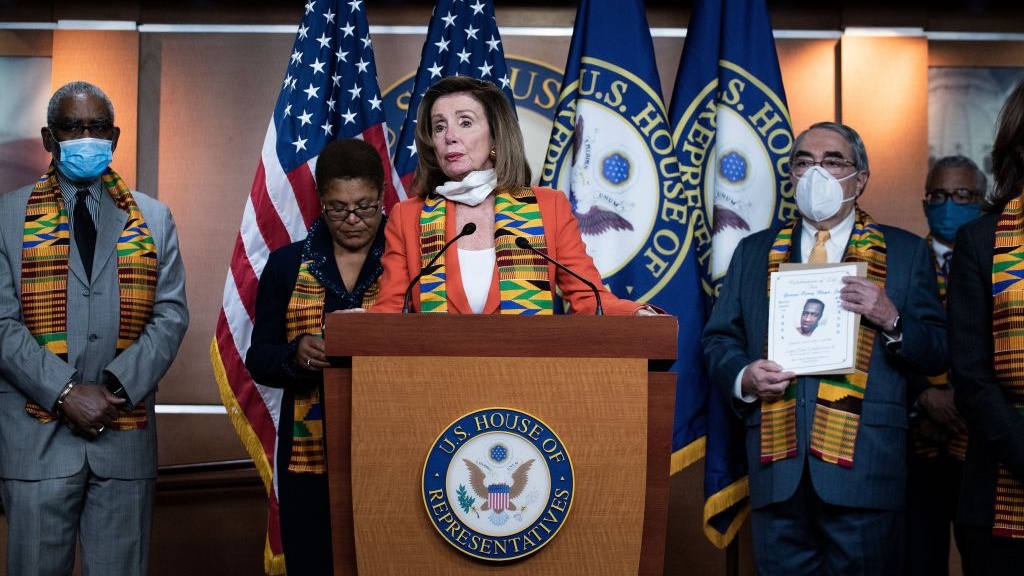The killing of George Floyd on Memorial Day by a Minneapolis police officer has triggered protests nationwide as advocates call for racial equity and police reform. Hearing their cries for justice, lawmakers in Washington went straight to work and, on Monday morning, unveiled the first bill that will severely limit law enforcement's ability to use excessive force.
"We can't settle for anything other than transformative structural change," House Speaker Nancy Pelosi, D-Calif., said, via NPR. "True justice can only be achieved with full, comprehensive action, that is what we are doing today. This is a first step; there is more to come."
Sens. Cory Booker, D-N.J., and Kamala Harris, D-Calif., helped to author the bill, joining forces with the Congressional Black Caucus, the House Judiciary Committee and 200 other Democratic House and Senate leaders.
"Persistent, unchecked bias in policing and a history of lack of accountability is wreaking havoc on the black community. Cities are literally on fire with the pain and anguish wrought by the violence visited upon black and brown bodies," the bill's sponsors said. "While there is no single policy prescription that will erase the decades of systemic racism and excessive policing — it's time we create structural change with meaningful reforms."
While this bill will not singlehandedly end police violence, it's quite a start. Interested in what the bill encompasses? Here are five things Democrats intend to accomplish with the Justice in Policing Act of 2020.
The Bill Seeks To End Qualified Immunity
As Vox explains, qualified immunity exempts authorities and public officials from civil lawsuits. Although it has maintained a consistent stance on qualified immunity in the past, the U.S. Supreme Court is currently debating whether it will hear arguments in a case challenging this practice when it reconvenes next term.
Police Departments Would Be Required To Turn Over Data To The Federal Government
Promising more accountability for law enforcement, this bill would require local police precincts to surrender data on the use of force to the federal government. In addition, NBC News notes that state attorneys general could develop a system to investigate claims of excessive use of force. In even more terrific news, the Justice in Policing Act would finally recognize lynching as a federal hate crime.
Police Officers Can Employ Deadly Force, But Only As A Last Resort
Per NBC, a curriculum that includes racial bias and duty-to-intervene training will be developed, with the protocol stating that authorities can justify the use of deadly force only as a final solution after they've employed de-escalation methods.
Additionally, the bill will design an official registry where misconduct complaints and disciplinary actions against law enforcement will be shared with the federal government. According to Vox, the registry is intended to track offenders and to prevent officers from being rehired after they've been fired for their use of excessive force.
Established Police Practices Would Be Banned
Under this legislation, The Washington Post reports that chokeholds, carotid holds and no-knock warrants in drug cases at the federal level would be prohibited. In order to urge states and communities to uphold these demands, the federal government will withhold funding until they comply.
Republican Pushback Is To Be Expected
Although it appears bipartisan support could arise, Republican colleagues won't exactly make this a smooth process from start to finish. The ongoing COVID-19 pandemic has resulted in an extended recess for House members.
"I think we can easily find common ground on both sides and we can do it swiftly, but it's more difficult if you're away," House Minority Leader Rep. Kevin McCarthy, R-Calif., explained to reporters Thursday, according to NPR. "Members of Congress should not be called back for one week and say, 'Here are all the bills.'"
Nonetheless, Congresswoman Karen Bass, D-Calif., has hope that as discussions begin, both parties will agree that they need to prevent the type of police actions that led to Floyd's death.
"I'm inclined to push the envelope as far as we can because we have a moment now," the Congressional Black Caucus chair said, per CBS News. "We feel it is transformative, that it will transform the relationships that our communities have with the police."
